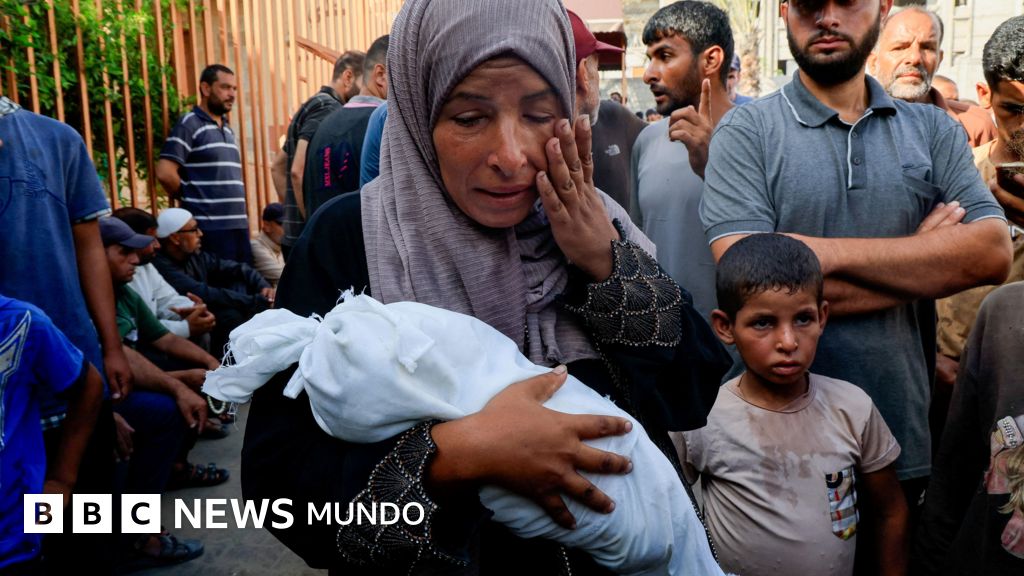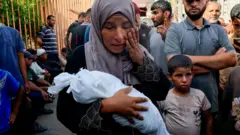

Image source, Reuters
-
- Author, Redacción*
- Author's title, BBC News World
“My children cry all night.”
The Barber Gazatí Mohammed Emad al DIN is the father of two children: “They have only eaten a small plate of lentils in the last three days. Last week a kilo of flour cost US $ 80”.
Emad the DIN had to stop working after an Israeli bombardment destroyed the solar panels of his barbershop, he told Gaza de la BBC, Rushdi Abualouf, which reports from Istanbul.
Now he cannot pay the food with which to feed his family, whose price has increased exponentially from the outbreak of the war in October 2023 and, above all, for the restrictions imposed by Israel.
The price of flour, a basic food, was at the beginning of July 3,000 times higher than before the war, according to the World Food Program (PMA). This UN agency warned that the strip faces a famine situation throughout the territory, due to severe food access restrictions to Gaza and the market collapse.
“The situation is the worst I have ever seen,” said his deputy executive director of Operations, Carl Skow, who visited Gaza at the beginning of the month.
This has caused that, only in the last 24 hours, at least 19 Palestinians, including several children, have starved in the strip, according to an official of the Gazatí Ministry of Health.
Among them is Yehia, the three-month baby of Alaa Al-Najjar, who died of malnutrition, according to doctors, at the Nasser hospital in Jan Yunis.
In total, the dead of Gaza already exceeds 59,000, and the one injured 142,000, according to the Ministry.
Asalto a deir Al-Dalah
The inhabitants of Gaza now face a new displacement, after the Israeli army ordered the evacuation of the city and Deir Al-Balah, in the center of the strip, where on Monday they began, for the first time since the beginning of the conflict, a terrestrial operation.
This city houses tens of thousands of refugees and also much of the UN staff and other humanitarian agencies operating in Gaza.
Having not been the scene of terrestrial fighting so far, in deir the Balah there are more buildings standing than in other parts of the strip and medical points, drinking water of the desalination plant and waste removal systems have worked.
One of the reasons why, according to Israeli sources, the army had not previously made an incursion to Deir Al-Balah was because it is believed that Hamas could have hidden there apart from the Israeli hostages that are still alive.
It is not clear for the moment that he may have changed his mind to the Israeli military.

Image source, Anadolu via Getty Images
Throughout the strip the situation in hospitals is critical, as Dr. Khalil Al Daqran, spokesman for the Al-Aqsa hospital in Deir Al-Balah, Rusdi Abualouf.
“Hospitals can no longer give food to patients or personnel, many of whom are physically unable to continue working due to extreme hunger,” said the doctor.
Child malnutrition
The average centers no longer count, according to Al Daqran, even with basic products such as maternal powder milk to give infants: “hospitals cannot provide a single milk bottle to children who go hungry, because the entire child formula has been exhausted in the market.” The figures published by the World Health Organization (WHO) and UNICEF show alarming levels of child malnutrition.
In May alone, more than 5,000 children under five received treatment due to acute malnutrition in Gaza, including more than 600 with severe acute malnutrition, a potentially deadly disease.
Israel imposed a strong strip blocking last March by breaking the high the fire agreed with Hamas in January.
After 11 weeks without entering a single humanitarian aid truck in Gaza, Israel began to channel the aid in May through a private entity of the United States known as “Gaza Humanitarian Foundation”, widely criticized by the UN and other help groups, which consider it “an abomination” and a “deadly trap”.
Since this entity is responsible for the cast, almost 1,000 people have died from gunfire of the Israeli army when they tried to get help for their families.
This Sunday, a large multitude of people waiting for the arrival of the UN food aid trucks in Northern Gaza managed to stop one of those trucks and take bags of flour.
According to witnesses, they raised their hands when the Israeli soldiers began to shoot them, but the shooting continued, says the BBC correspondent in Jerusalem, Yolande Knell.
According to the World Food Program there were snipers and tank shots occurred.
At least 67 people died.
The Israeli army refutes these versions and states that their forces felt an immediate threat and made warning shots. He has shared some images that show his standing soldiers while a large multitude of Palestinians seemed to surround a help truck that had been stripped of his supplies.

Image source, Anadolu via Getty Images
This Monday, smoke columns could be seen from Deir El Balah after the start of Israeli operations.
According to the British charity, medical help for the Palestinians, the situation in the city is “extremely serious”, as described by its communication manager, who said that bombings were taking place near his office.
Military vehicles “are only 400 meters from our colleagues and their families, which have spent a distressing night after moving there,” he said.
The population is evacuating the city, explained Mai Elawawda, who says that most people do not know how to go.
“A partner told us that the area is full of bombings and helicopter attacks, and that there is more and more fear of staying and trying to leave,” Elawawda said.
*With information from Rusdi Abualouf, Yolande Knell and Omar Hassan.

Subscribe here To our new newsletter to receive every Friday a selection of our best content of the week.
And remember that you can receive notifications in our app. Download the latest version and act.



